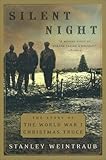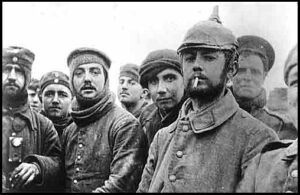A Book Review  of Stanley Weintraub’s Silent Night.
of Stanley Weintraub’s Silent Night.
Some book reviews that I write are rather long, primarily because they were originally written for a theology class or something similar. However, I do not intend for all my book reviews to be that long-winded. Stanley Weintraub’s Silent Night isn’t a book that warrants a long review because the point is so clear. The book is about the World War I Christmas Truce. All over the front lines in Europe in 1914, men laid down their arms and remembered the Prince of Peace. During and afterwards, many wondered why they were fighting in the first place. Weintraub’s book retells the events of “horror taking a holiday” over Christmas on the front lines through soldiers’ personal recollections and other reports.
On June 28, 1914, Bosnian-Serb student Gavrilo Princip assassinated Archduke Franz Ferdinand, the heir to the Austro-Hungarian throne. The murder triggered a fast-paced series of events that ultimately led to what we now call World War I. On one side were the Entente Powers: France, the United Kingdom, and Russia; on the other side were the Central Powers: Germany and Austria-Hungary. By August 1914, the countries were engaged in total war the likes of which had never been seen on earth – trench warfare. On the front lines, opposing men were separated at times by less than 100 feet, living in filthy trenches dug into the ground. Both sides believed that the war would be over quickly, but as December 1914 approached such a resolution seemed much less likely. Soldiers excited of the prospects of war glory quickly lost their initial enthusiasm in favor of sheer survival. But as Christmas eve approached, an unlikely truce was forged by troops all across the front lines. Much was learned when those who only knew their enemies through propaganda and caricatures actually conversed with their foes.
 According to Weintraub, in the days before Christmas unofficial displays of “truce” were already beginning to be formed. In one case, Germans came out of the trenches with their hands up and would retrieve the wounded in “No-Man’s Land.” The French and English soldiers then did the same. Remarkably, conversations began between the opponents as well, and both sides found that the other consisted of “extraordinarily fine men… It seemed too ironical for words. There, the night before we had been having a terrific battle and the morning after, there we were smoking their cigarettes and they smoking ours.” Many times, these humane activities were initiated by the invading Germans! By the 23rd of December, units all over the front lines were able to communicate to the “enemy” that they were willing to call a cease fire in the observance of Christmas. Decorations adorned the trenches the soldiers called home – especially the Germans with their tannenbaum trees. The Germans had so many trees, in fact, that they shared them with the English and French! The truce had “bubbled up from the ranks.”
According to Weintraub, in the days before Christmas unofficial displays of “truce” were already beginning to be formed. In one case, Germans came out of the trenches with their hands up and would retrieve the wounded in “No-Man’s Land.” The French and English soldiers then did the same. Remarkably, conversations began between the opponents as well, and both sides found that the other consisted of “extraordinarily fine men… It seemed too ironical for words. There, the night before we had been having a terrific battle and the morning after, there we were smoking their cigarettes and they smoking ours.” Many times, these humane activities were initiated by the invading Germans! By the 23rd of December, units all over the front lines were able to communicate to the “enemy” that they were willing to call a cease fire in the observance of Christmas. Decorations adorned the trenches the soldiers called home – especially the Germans with their tannenbaum trees. The Germans had so many trees, in fact, that they shared them with the English and French! The truce had “bubbled up from the ranks.”
On the home fronts of the English and Germans, civilians contributed lots of personal resources to give something to the soldiers for Christmas. Boxes of cigars, candies, treats, and trinkets were sent to the soldiers care of the Queen or the Kaiser. As the troops met one another and exchanged greetings, they also exchanged gifts. The result, in some cases, were virtual feasts that included everything from English plum pudding to fine wine and beer. Even more bizarre, Germans and English exchanged addresses with their newfound comrades in hopes of visiting once the war was over. Seeing people who days before were shooting deadly weapons at one another now eating and drinking together must have been quite a spectacle! Of course, some didn’t like this development. A young Adolf Hitler, then a Colonel in the German army, felt that such fraternization should be banned. Apparently he was recorded as saying, “Such a thing should not happen in wartime… Have you no German sense of honor at all?”
“Everywhere, Christmas ritual – especially song – eased the anxiety and fear of initial contact.” The singing of Christmas carols was one of the activities that brought the opposing sides together in peace for this short time. Often, these “enemies” alternated singing songs in their native languages to one another – though some songs were universal even then. Perhaps the most popular song sung was “Stille Nacht, heilige Nacht,” otherwise known as “Silent Night.” In a few cases, opera singers from Paris and Berlin who had been drafted to fight led the soldiers in song or performed for them. One can easily imagine that those elegant words “sleep in heavenly peace” must have had great significance to these soldiers, who suffered through the cold and muddy existence in the trenches deprived of sleep, health, family, and peace.
The merriment of food and song led to other forms of entertainment as well, namely playing soccer (although, Europeans call it football). Some couldn’t believe their eyes, like Sergeant Bob Lovell of the 3rd London Rifles: “Even as I write, I can scarcely credit what I have seen and done,” referencing his regiment’s soccer match with the Germans, “It has indeed been a wonderful day.” There are numerous accounts of soccer games in “No-Man’s Land,” such as the following from Kurt Zehmisch of the 134th Saxons: “Eventually the English brought a soccer ball from their trenches, and pretty soon a lively game ensued. How marvelously wonderful, yet how strange it was. The English officers felt the same way about it. Thus Christmas, the celebration of Love, managed to bring mortal enemies together as our friends for a time… I told them we didn’t want to shoot on the Second Day of Christmas either. They agreed.” In some cases, the games made commanding officers rather unhappy. One William Dawkins of the East Kents recalled, “the Germans… fetched a football, and invited our boys out for a little game. Our boys joined them and together they quickly had great fun, till they had to return to their posts. I cannot guarantee it, but it was told to me that our lieutenant colonel threatened our soldiers with machine guns. Had just one of these Big Mouths gathered together ten thousand footballs, what a happy solution that would have been, without bloodshed.” Indeed, as usual it is the regular folk who are much more capable of solving conflicts without violence than those who lead armies.
 The truce was not observed everywhere on the front lines, but for those who did it was, not surprisingly, quite awkward to pick up arms again in the future. Many of them simply were not interested in continuing to fight. Some regiments let their adversaries know that they had been ordered to shoot again, but they would aim extra high as to miss them (although they usually advised them to keep their heads down anyway). If not for the belligerence of commanding officers and generals, it seems unlikely that fighting would have continued from regiments who had so recently seen that the people they were fighting against were much like them. Getting back to the ugly business of war just didn’t feel right:
The truce was not observed everywhere on the front lines, but for those who did it was, not surprisingly, quite awkward to pick up arms again in the future. Many of them simply were not interested in continuing to fight. Some regiments let their adversaries know that they had been ordered to shoot again, but they would aim extra high as to miss them (although they usually advised them to keep their heads down anyway). If not for the belligerence of commanding officers and generals, it seems unlikely that fighting would have continued from regiments who had so recently seen that the people they were fighting against were much like them. Getting back to the ugly business of war just didn’t feel right:
‘On going out he found a very polite and spotless individual waiting for him, who, after an exchange of compliments, informed him that his Colonel had given orders for a renewal of hostilities at mid-day and might the men be warned to keep down, please?’ The British captain thanked the Hauptmann for his courtesy, ‘whereupon, saluting and bowing from the waist, he replied, “We are Saxons; you are Anglo-Saxons; [the] word of a gentleman is for us as for you.” ‘
Weinstraub’s stories from the Truce days are fascinating, but his last chapter What if? is particularly interesting. He speculates into alternative history – what would have happened if the Christmas Truce stuck? Perhaps the war would have ended in stalemate rather than prolonging for four more years. Bolshevism would have failed without Vladimir Lenin, who was slipped into Russia by the Germans in 1917. The United States would not have been the deciding factor in the war and they would not have been involved in the failed Versailles treaty. Adolf Hitler would have remained a measly Colonel without a pretense to promote German National Socialism. Most of all, millions of lives would have been spared.
And this is probably the ultimate lesson of war – that the dead can never be replaced. Those people for whom Christ died are now gone. Our task, if any, is never to glorify such horrible violence and to remember that it is the governments that pit nations against each other that are the enemy – not the people. Weintraub’s book about the Christmas Truce reminds us that peace is possible even in the most dire of circumstances.
Purchase Stanley Weintraub’s Silent Night from Amazon.com and support my book buying, reading, and writing habits!



), //libertarianchristians.com/wp-content/plugins/smartquizbuilder/includes/images/template6-latest.jpeg))

), https://libertarianchristians.com/wp-content/plugins/smartquizbuilder/includes/images/template6-latest.jpeg))


;?>/smartquizbuilder/includes/images/sqb-registration-img.jpg)

